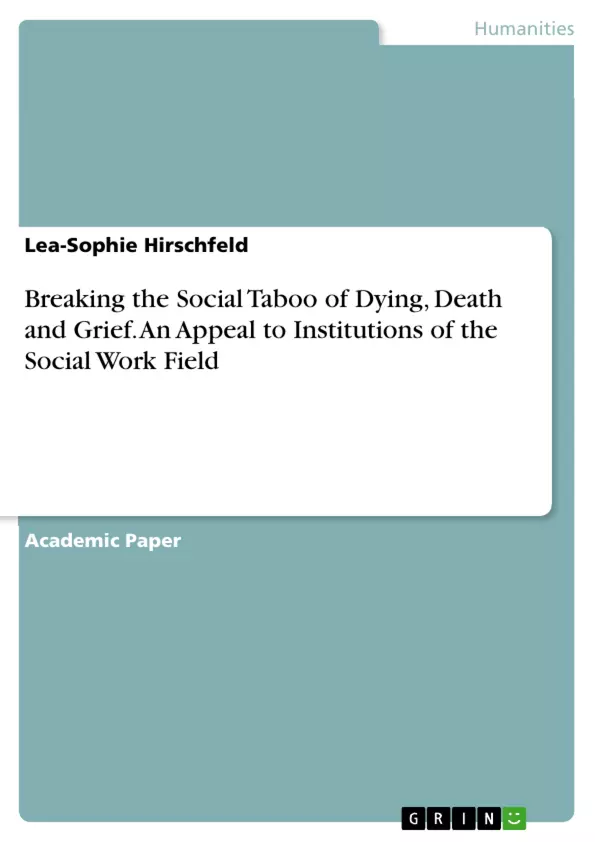In my theory-based thesis, I will deal with the hypothesis: Every person, regardless of cognitive abilities, is able to mourn, to understand death, and they should not be denied that. A differentiated conclusion should be an appeal to social institutions in particular to break the taboo on the topics of dying, death and grief and to show possible solutions for raising awareness with regard to work, or dealing with people with cognitive disabilities and dealing with the end of life.
In the beginning, I will explain the terms "death" and "disability" in context of their social taboo, in order to then go into more detail about their connection and to emphasize the motive of the thesis. This will be followed by a more extensive discussion, which, based on Piaget's stage model of cognitive development and Wittkowski's concept of death, will use appropriate practical examples in the form of participatory observations to demonstrate that people with a wide range of cognitive abilities are capable of understanding "death".
In addition, I would like to discuss the extent to which personal fear of being confronted with death and possibly other factors motivate employees of social institutions and relatives to exercise the aforementioned reluctance towards the clients. Among other things, I would like to use Franke's work to justify the individual and social benefit of further taboo breaking. Finally, I will summarize my findings regarding the need for change in the attitude towards death in social work and show possible solutions.
Ultimately, the thesis should serve as an appeal to the reader and in particular to social institutions to question the personal and professional handling of the topics of dying, death and grief and invite them to deal with it more intensively in order to gain a more conscious approach and thus to be able to support people with cognitive disabilities in a more sensitive and individual manner.
Inhaltsverzeichnis (Table of Contents)
- The starting point: The assumption of "not understanding"
- When "taboos" meet death and disability
- Explanation in context of their social taboo....
- Development theory and concept of death: From Piaget to Wittkowski.....
- Possible linking of the concepts
- Three practical examples: People who understand death..
- The death of a brother
- A daughter's grief………………………..\n
- The hubris of preservation
- The end - A conclusion....
Zielsetzung und Themenschwerpunkte (Objectives and Key Themes)
This thesis aims to challenge the social taboo surrounding death and grief within social work institutions, specifically in the context of individuals with cognitive disabilities. It advocates for a more inclusive approach that recognizes the capacity of all individuals to understand and process death.
- The social taboo surrounding death and disability
- The ability of individuals with cognitive disabilities to understand death
- The impact of societal stigma and prejudice on the understanding of death
- The need for awareness-raising initiatives within social work institutions
- The importance of providing support and resources for individuals with cognitive disabilities and their families in dealing with death and grief
Zusammenfassung der Kapitel (Chapter Summaries)
- The starting point: The assumption of "not understanding": This chapter introduces the thesis' central argument, highlighting the author's personal experiences and observations within the hospice and funeral home settings. It establishes the problem of societal denial and lack of awareness surrounding death, particularly in relation to individuals with cognitive disabilities.
- When "taboos" meet death and disability: This chapter delves into the historical and social context of both death and disability as taboo subjects. It explores the historical evolution of attitudes towards death, highlighting the shift from acceptance to fear and repression. The chapter further examines the social stigma associated with disability and its impact on individual self-determination.
Schlüsselwörter (Keywords)
This thesis focuses on the intersection of disability, death, and grief within the context of social work institutions. It explores key themes such as societal taboos, cognitive development, stigma, self-determination, and inclusive approaches to supporting individuals with disabilities in navigating death and grief.
Frequently Asked Questions
Can people with cognitive disabilities understand death?
Yes, the thesis argues that every person, regardless of cognitive ability, is capable of mourning and understanding death in their own way.
What is the "hubris of preservation"?
It refers to the tendency of relatives and caregivers to shield individuals with disabilities from the topics of death and grief, often out of their own fear or the false assumption that they cannot understand it.
Which theories are used to explain the concept of death?
The thesis utilizes Piaget's stage model of cognitive development and Wittkowski's concept of death to analyze how individuals process the end of life.
Why is death still a taboo in social work institutions?
The thesis explores factors like personal fear, lack of training, and societal stigma that prevent social workers from addressing grief with their clients.
What is the main appeal of this thesis?
It serves as an appeal to social institutions to break the taboo on dying, death, and grief, and to support people with cognitive disabilities more individually and sensitively.
- Quote paper
- Lea-Sophie Hirschfeld (Author), 2022, Breaking the Social Taboo of Dying, Death and Grief. An Appeal to Institutions of the Social Work Field, Munich, GRIN Verlag, https://www.grin.com/document/1264767



